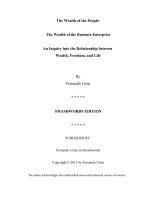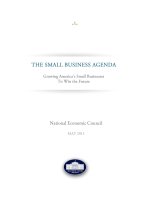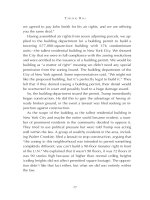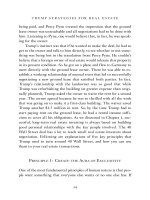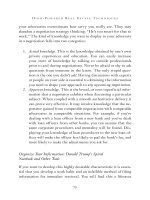Researching the small enterprise
Bạn đang xem bản rút gọn của tài liệu. Xem và tải ngay bản đầy đủ của tài liệu tại đây (1.26 MB, 225 trang )
Understanding Management Research
Understanding Management Research
An Introduction to Epistemology
Phil Johnson and Joanne Duberley
SAGE Publications
London · Thousand Oaks · New Delhi
Ø Phil Johnson and Joanne Duberley 2000
First published 2000
Apart from any fair dealing for the purposes of research or
private study, or criticism or review, as permitted under the
Copyright, Designs and Patents Act 1988, this publication
may be reproduced, stored or transmitted in any form, or by
any means, only with the prior permission in writing of the
publishers or, in the case of reprographic reproduction, in
accordance with the terms of licences issued by the Copyright
Licensing Agency. Inquiries concerning reproduction outside
those terms should be sent to the publishers.
SAGE Publications Ltd
6 Bonhill Street
London EC2A 4PU
SAGE Publications Inc.
2455 Teller Road
Thousand Oaks, California 91320
SAGE Publications India Pvt Ltd
32, M-Block Market
Greater Kailash ± I
New Delhi 110 048
British Library Cataloguing in Publication data
A catalogue record for this book is available
from the British Library
ISBN 0 7619 5294 9
ISBN 0 7619 5295 0 (pbk)
Library of Congress catalog card number 00 132732
Typeset by Mayhew Typesetting, Rhayader, Powys
Printed in Great Britain by The Cromwell Press Ltd,
Trowbridge, Wiltshire
Contents
Preface
vi
1 Introduction ± The Importance of Epistemology in
Management Research
1
2 Positivist Epistemology ± The Search for Foundations?
11
3 Positivism ± The Management Mainstream?
38
4 Conventionalist Epistemology ± The Socialization of Science?
62
5 Postmodernist Epistemology ± Relativism Unleashed?
91
6 Critical Theory and Management ± The Return to
Rationalism and the Promise of Progress?
115
7 Pragmatism and Critical Realism ± Transcending Descartes'
Either/Or?
148
8 Conclusions ± A More Re¯exive Approach towards
Management Research
177
References
193
Index
210
Preface
This book is an introduction to a key issue in management research that
usually goes unnoticed ± epistemology and its variability. Our thesis is that
management research can never be isolated from epistemological commitments whose diversity leads to different possible ways of approaching
and engaging with any substantive area. While we attempt to give a general
overview of the epistemologies which have had a signi®cant impact upon
the aims, processes and content of management research, we have tried not
to sacri®ce depth for comprehensiveness. Instead we have been selective
regarding the perspectives covered, their philosophical exemplars and their
management advocates so as to introduce a series of complex ideas and
rationales to the reader. Hence we have covered what we feel to be
important not just in terms of in¯uence but also in terms of variability. So
throughout we have tried to explain the points of connection and departure
between rival epistemologies.
Inevitably, writing a book like this will upset some readers. This might
be because of what we have or have not covered ± but more likely it will
be with how we have classi®ed particular scholars' contributions as positivist, conventionalist, postmodernist and so on. Throughout we try to be
clear about our underlying criteria for classi®cation. Here, however, we
would also like to emphasize our view that many writers vary their own
epistemological position in different pieces of work. So the classi®catory
outcome in this book might thus seem rather unfair ± a particular author
might only appear under one particular epistemological heading whereas
much of their other work is elsewhere. By way of apology, the point for us
is that we are selectively using scholars' work as illustrative examples and
we do not mean to squeeze any particular author exclusively into a
particular category.
We would like to thank Marianne Lagrange for her initial support and
enthusiasm for the idea of this book and the subsequent help and
encouragement of Rosemary Nixon and her colleagues at Sage. The ideas
presented in this book have been discussed with many people over the
years ± sometimes only inferentially, sometimes controversially but always
in a manner that has been stimulating. We would like to thank our friends
and colleagues at Shef®eld Hallam University, Shef®eld University and
elsewhere, as well as our students past and present, who have consciously
or inadvertently contributed to our understanding of epistemology and its
Preface
vii
impacts upon management research. We would particularly like to
acknowledge Tony Berry, Neil Burns, Murray Clark, John Darwin, John
Desmond, Keith Duberley, Anne Fearfull, Bob Grafton-Small, John Gill,
David Golding, Yvonne Hill, John Kawalek, Janet Kirkham, Steve
Linstead, Mary Mallon, Stuart Manson, Hugh Willmott and Joe Nason.
We would also like to thank Cathy Cassell, Laurie Cohen, John McAuley,
Gill Musson and Ken Smith who were kind enough to read earlier drafts
and give helpful and incisive feedback. Last, but by no means least,
thanks to Carole for her support and Andy for his provision of entertaining diversions as well as his support over so many months.
1
Introduction ± The Importance of
Epistemology in Management
Research
Organizational scholars can resist philosophy as long as they assume the
ends of institutions and the current de®nitions of those ends by
participants or scholars.
(Zald, 1996: 257)
The main objective of this book is to provoke debate and re¯ection upon
the different ways in which we engage with management and organization
when undertaking research. Our argument is that how we come to ask
particular questions, how we assess the relevance and value of different
research methodologies so that we can investigate those questions, how
we evaluate the outputs of research, all express and vary according to our
underlying epistemological commitments. Even though they often remain
unrecognized by the individual, such epistemological commitments are a
key feature of our pre-understandings which in¯uence how we make
things intelligible. Therefore this book tries to offer the reader an overview
of the principal epistemological debates in social science and how these
lead to, and are expressed in, different ways of conceiving and undertaking management and organizational research. Obviously, in a book of
this size it is impossible to do justice to the full range of issues raised by
this objective. Instead we hope that it will provide a concise and accessible
introduction which will stimulate the reader's interest in epistemological
issues and their implications for thinking about management and
organization.
One reason why we feel that these objectives are important derives from
our experience that students in the UK are increasingly expected to
demonstrate a re¯exive understanding of their own epistemological commitments as they engage with management and organizations in undertaking empirical research for theses and dissertations. Previously,
researchers in management studies have been criticised for being uncritical
and ill informed in their adoption of particular positions with regard to
research (see, for example, Whitley, 1984a). This is beginning to change
and some of these issues are covered in a disparate set of journals (e.g.
2
Understanding management research
Organization Studies; Academy of Management Review; Organization;
Accounting, Organizations and Society; and Human Relations, to name only
a few). Their style and language-in-use, however, are often daunting and
inaccessible to those yet to be admitted into the conventions of philosophical discourse.
Nevertheless many students and researchers are still expected to read
and comprehend a burgeoning literature which increasingly deploys
epistemological concepts and language. For instance, in order to understand the current debate in the literature between modernists, critical
modernists and postmodernists (whether this is about corporate strategy,
human resources management or accountancy etc.) a high level of prior
epistemological understanding is essential. Hence a key rationale for this
book is to give readers an accessible grounding in epistemology that helps
them to comprehend these ongoing debates and to engage with their own
pre-understandings when trying to make sense of management and
organization.
An underlying assumption of the book is that both within and outside
our work organizations our behaviour is internally motivated, and
internally justi®ed, by what we believe about `the world'. At the same
time, even though we might not be immediately conscious of it, everyone
has a view about what demarcates justi®ed from unjusti®ed belief. Indeed
our claims about being rational or irrational or about what is true as
opposed to what is false are tacitly grounded in such implicit differentiations. Perhaps these ways of thinking are so embedded in our language
and culture that if we were to re¯ect upon them they would appear to be a
matter of common sense and therefore natural and irresistible. Nevertheless our debates and conjectures about what is true presuppose prior
agreement (a pre-understanding that is shared) about how we determine
whether or not something is true. Similarly, any epistemological analysis
of the grounds of certain knowledge or the scienti®city of truth claims
involves ontological assumptions about the nature of the world (Bhaskar,
1975). This signi®es that in our everyday lives we are all epistemologists ±
or at least we routinely take certain epistemological conventions to be so
self-evident we rarely feel the need consciously to express, discuss or
question them. Indeed it may be the case that to notice and then consciously to re¯ect upon such conventions are the ®rst steps in making the
commonsensical and self-evident, precarious and problematic.
Although scientists and philosophers have debated epistemological
questions since the time of Plato and Aristotle, the term `epistemology'
remains somewhat esoteric for most people and usually it obfuscates more
than it reveals. However once we break down the word into its constituent
parts it seems much less daunting. The word derives from two Greek
words: `episteme' which means `knowledge' or `science'; and `logos' which
means `knowledge', `information', `theory' or `account'. This aetiology
demonstrates how epistemology is usually understood as being concerned
with knowledge about knowledge. In other words, epistemology is the
The importance of epistemology in management research
3
study of the criteria by which we can know what does and does not
constitute warranted, or scienti®c, knowledge. Therefore it would seem
that epistemology assumes some vantage point, one step removed from
the actual practice of science itself. At ®rst sight this promises to provide
some foundation for scienti®c knowledge: a methodological and theoretical beginning located in normative standards that enable the evaluation
of knowledge by specifying what is permissible and hence the discrimination of warranted belief from the unwarranted, the rational from the
irrational, the scienti®c from pseudoscience.
According to Richard Rorty, a North American philosopher, this notion
that epistemology is the discipline that enables the judgement of all other
disciplines arose in seventeenth-century Europe. It expresses the desire `to
®nd ``foundations'' to which one might cling, frameworks beyond which
one must not stray, objects which impose themselves, representations
which cannot be gainsaid' (1979: 315). Accordingly, by seeking to explain
ourselves as knowers, by telling us how we ought to arrive at our beliefs,
epistemology is pivotal to science since `proper' scienti®c theorizing can
only occur after the development of epistemological theory. It follows that
a key question must be: how can we develop an epistemological theory ± a
science of science?
One answer to the above question is suggested by Quine (1969) where
he argues that epistemology should abandon any philosophical questions
and become a branch of experimental psychology which analyses human
cognitive processes through empirical research. The aim would be to
produce a science of science where the laws of cognition tell us why and
how we hold the theories that we do. At ®rst sight this programme seems
an eminently sensible solution ± to paraphrase Quine, a science of science
which is science ± but one which, incidentally, may make this book rather
pointless. However two interrelated problems arise here.
First, since epistemology determines the criteria by which justi®ed
knowledge is possible, it must not itself take for granted the results of
particular forms of empirical inquiry such as experimental psychology.
Secondly, we cannot presuppose that there exists some analytical space
that may be occupied by experimental psychologists that is somehow free
from the very philosophical assumptions that in¯uence how we engage in
justi®able `knowing'. Experimental psychology is itself based upon a
plethora of philosophical assumptions regarding the possibility of knowledge in experimental psychology which are themselves contestable. So it
would appear that Quine's rejection of philosophical questions merely
creates an unsustainable philosophical vacuum that is promptly ®lled by
default by some new, but unrecognized, set of philosophical commitments.
Here the paradox, as shown in Figure 1.1 below, is that epistemology
confronts a fundamental problem of circularity, from which it cannot
escape, in that any theory of knowledge (i.e. any epistemology) presupposes knowledge of the conditions in which knowledge takes place. In
4
Understanding management research
Epistemological knowledge of the
conditions in which warranted
knowledge takes place
Presupposes
Presupposes
Epistemological knowledge of the
conditions in which warranted
knowledge takes place
Figure 1.1 The circularity of epistemology
effect, this prevents any grounding of epistemology in what purports to be
scienti®c knowledge ± psychological or otherwise ± because one cannot
use science in order to ground the legitimacy of science.
Hence the seventeenth-century promise of epistemology to provide
secure foundations for scienti®c knowledge seems a forlorn hope precisely
because of circularity. For instance Otto Neurath has described this
problem of circularity in terms of a nautical metaphor:
we are like sailors who on the open sea must reconstruct their ship but are never
able to start afresh from the bottom . . . They make use of some drifting timber
of the old structure, to modify the skeleton and the hull of their vessel. But
they cannot put into dock in order to start from scratch. During their work they
stay on the old structure and deal with heavy gales and thundering waves.
(1944: 47)
For Neurath the problem of circularity means that we cannot dump philosophy by detaching ourselves from our epistemological commitments so as
to assess those commitments objectively ± indeed we would depend upon
them in order to undertake that task. It follows that there are no secure or
incontestable foundations from which we can begin any consideration of
our knowledge of knowledge ± rather what we have are competing philosophical assumptions about knowledge that lead us to engage with management and organizations in particular ways. Therefore the reader who hopes
that this book will provide them with irreducible epistemic standards to
guide and improve their research will be disappointed. Perhaps the most
we can hope for in considering epistemology is to become more consciously
re¯exive. This involves an attempt at self-comprehension through beginning to notice and then criticize our own pre-understandings in a more
systematic fashion while trying to assess their impact upon how we engage
with the social and natural worlds. Such self-comprehension not only
The importance of epistemology in management research
5
entails identifying our epistemological pre-understandings and their philosophical derivation, it also requires us to challenge them by noticing and
exploring alternative possible commitments.
The point is that everyone adheres to some theory about what constitutes warranted knowledge ± a set of epistemological commitments
which provide us with criteria for distinguishing between reliable and
unreliable knowledge. If we didn't have such theories, no matter how
tacit, we would never be able to make what we construe as legitimate
claims about what we think we know or think we have experienced.
Mundane claims such as `I saw it with my own eyes' or `The facts speak
for themselves' presuppose that such appeals refer to evidence which is
epistemologically legitimate. Such commitments provide us with criteria
which we use to assess which kinds of description and explanation of our
social or natural worlds are appropriate. Moreover, as we have just shown,
closely allied to those commitments are also notions about what might
warrant the status of being `scienti®c'. Indeed epistemological commitments also provide tacit answers to questions about:
1 What are the origins, nature and limits of scienti®c knowledge?
2 What constitutes scienti®c practice?
3 What are the processes through which scienti®c knowledge advances
or is such progress a forlorn hope?
So, for instance, because of their education and training scientists are
commonly thought to be, in principle, objective observers of the world.
Their expertise and rigorous deployment of accepted procedures and
protocols allow scientists to collect empirical evidence about the social and
natural worlds. The apprehended form and content of either world is
usually understood to be separate from, or independent of, the methodological means by which scientists engage with it. In other words the data
collected, rather than the processes of observation, dictate the ®ndings and
theories of science. Mistakes can and do happen: individual scientists may
misunderstand the signi®cance of their data, they may make methodological errors and indeed they might be wilfully biased or even corrupt.
Nevertheless it is commonly assumed that errors and biases can be
corrected through improvements in the training, recruitment and selection
of scientists as well as by the surveillance of scienti®c ®ndings by a wider
community of scientists. The key epistemological assumption is that the
stock of knowledge advances as scientists actually learn more about the
world as well as through the exposure of the fraudulent and the eradication
of mistakes through critical processes akin to quality control undertaken by
peers. Hence science is progressive; moreover its outputs can be trusted
because its ultimate arbiter is to be found in the objective observational
processes encoded into its methodology and self-regulation which make it
a superior means of knowledge acquisition.
The above account of science expresses what Robert K. Merton (1938±
70) called the `ethos of science'. In his analysis of seventeenth-century
6
Understanding management research
England Merton argues (ibid.: 136±8) that Puritan values that emphasized
utility, rationality, empiricism and worldly asceticism contributed signi®cantly to the rise of modern science in England and its subsequent diaspora. In support of this notion he considered that the over-representation
of Puritans amongst the founding membership of the Royal Society
proffers evidence of the link between Puritanism and the modern scienti®c
community. For Merton these values became embedded in the ethos of
science which, now severed from the religious commitments of its
founders, enables the production and arbitration of knowledge claims with
an objectivity that `precludes particularism'.
In 1938 Merton's account of what he had observed as the scienti®c
ethos was to a degree aimed at defending science from what he saw as
Nazism's anti-intellectual contempt for science which at the time had tied
some of the German sciences to an ideology steeped in racism and the
occult. Merton summarized this scienti®c ethos (ibid.: 259) as being
composed of four sets of `institutional imperatives': `universalism', the
principle that scienti®c truth is dependent upon pre-established impersonal criteria which ensure intellectual honesty; `communism', the principle that scienti®c truth is the product of social collaboration; `organized
scepticism'; and `disinterestedness' where the activities of scientists are
subject to rigorous impersonal policing against fraudulent contributions.
Thus Merton seems to argue that while modern scienti®c methodology
and epistemology are in many respects an historical evolution of particular
religious values, these values are functional to the advancement of science
± they aid the search for objectivity and truth. So just as Merton accords
science some socio-cultural status by giving credence to the view that the
religious values propagated by the reformation ushered in a new science,
he also proceeds to accord science an extra-socio-cultural status by in
effect arguing that those values enabled science to develop to a level that
transcended social in¯uences because of the epistemological protection
they afford.
The notion that science is a mode of inquiry that transcends social
in¯uences so that it can be free from ideological contamination accords
with Weber's demand for a value-free social science (1949). Here Weber
made a categorical distinction between empirical facts and value dispositions: the former derive from a cognitively accessible reality, whereas the
latter derive from cultural dispositions. For Weber science dealt with
facts; it does not and cannot resolve matters of value ± a commitment that
is adhered to by many contemporary scholars of management and organization. An effect of this stance is to render scienti®c activities as sociologically unproblematic and functional to the advancement of warranted
knowledge.
Of course, as we shall show in this book, such a view of science as
value-free is itself grounded in a particular epistemological tradition which
when subject to critical examination becomes highly contentious. Moreover that it is only a particular tradition implies the existence of heterodox
The importance of epistemology in management research
7
alternatives which may be just as signi®cant if less familiar and commonsensical. Indeed criticizing the expression of Merton's and Weber's views
in management and organization as an establishment myth is an increasingly popular pastime, albeit now more commonly associated with the
political Left rather than the Right. Often, but by no means exclusively,
such attacks will tacitly accord with Bloor's view that knowledge
is whatever men take to be knowledge. It consists of those beliefs which men
(sic) con®dently hold to and live by . . . what is collectively endorsed, leaving
the individual and idiosyncratic to count as mere belief. (1976: 2±3)
Here Bloor is taking the position that knowledge and science are the
arbitrary outputs of social processes from which no one is exempted ±
there are no objective ways of discriminating the warranted from the
unwarranted ± all we have are just different culturally derived ways of
knowing the world which vary in their substance and to the extent that they
have been accorded social legitimation. From this perspective Merton's
ethos of science should not be seen as de®ning clear social obligations to
which scientists conform. Rather they may be understood as `¯exible
vocabularies employed by participants in their attempts to negotiate
suitable meanings for their own and others' acts in various social contexts'
(Mulkay, 1979: 72) ± vocabularies which are bounded by the social and
technical cultures shared by the scientists' particular problem-centred
community. While the unorthodox might not be allowed a public forum
since their assertions are outside the accepted repertoire, the precise
meaning of the orthodoxy has to be re-established through symbolic
negotiation, particularly when new domains or problems emerge (ibid.:
78±95).
Of course it would be interesting, if also rather mischievous, to speculate upon what Bloor or Mulkay would make of Merton's target, Nazi
science and its repercussions, since it would seem that its epistemic status
would be equivalent to any other body of knowledge which had been
collectively endorsed: just another culturally derived process which
presumably cannot therefore be criticized because all the critic would be
doing is imposing their own culturally embedded beliefs?
However the point to which we wish to limit ourselves here is merely
that our epistemological commitments in¯uence the processes through
which we develop what we take to be warranted knowledge of the world.
Such deeply held taken-for-granted assumptions about how we come `to
know' in¯uence what we experience as being true or false, what we mean
by true or false, and indeed whether we think that true and false are viable
constructs. As we shall show, this is even the case where, as is increasingly
popular in management and organizational research, Merton's ethos is
rejected in favour of a view of science as a relative outcome of intuition,
paradigm, metaphor, discourse, social convention or fashion. Even to say
that there can be no reliable knowledge (in Merton's sense) beyond some
ethnocentric collective endorsement, and hence cast doubt upon the
8
Understanding management research
relevance of epistemology as a philosophical endeavour, is paradoxically
grounded in the `hidden hand' of epistemological reasoning as to why no
such asocial, objective, value-free knowledge is ever possible.
So in any discipline, profession, occupation or everyday activity where
knowledge claims are routinely made, epistemology contributes by clarifying the conditions and limits of what is construed as justi®ed knowledge
± whether or not the people involved recognize this as so. No one can
stand outside epistemological processes, whether they be researchers or
managers. Indeed many writers have reminded us that managers routinely
undertake research as they try to make sense of organizational events and
phenomena or discern and evaluate possible courses of action (for
example, Mintzberg, 1973; Schon, 1983). It follows that every management strategy, every policy and intervention, implicitly or explicitly,
articulates an epistemological position that authorizes the knowledge
claims that justify its substantive content. The mere act of describing
something as `evidence' is to evaluate it epistemologically and accord it
some kind of epistemic status. So if we take seriously the argument that a
key skill that any manager should possess is the ability to re¯ect critically
upon the modes of engagement they deploy in making sense of their
experience, then the importance of epistemology to practitioners is only
too evident because studying epistemology exposes to critical interrogation the often unnoticed taken-for-granted assumptions and values which
in¯uence how versions of reality are socially constructed ± which then
in¯uence action.
In this book we are not so much directly concerned with everyday
management practices as with how we engage with `management and
organization' as social phenomena. This is because how we construct our
understandings of the nature of the various management disciplines, of
management practice and of management research in many respects
depends upon our ideas concerning epistemology. Until recently these
assumptions were usually left tacit or implicit and were rarely clearly
presented or subjected to sustained re¯ection and evaluation through their
juxtaposition, or confrontation, with possible alternatives. It is to this
relatively new re¯exive spirit (see Willmott, 1995) that this book seeks to
appeal, contribute and encourage by attempting to clarify the different
relationships we can have with our subject of interest ± management and
organization.
While it is evident that this new spirit has gained some popularity and
in¯uence, it is also evident that the prevailing received view of management
and organizational research engenders the deployment of what are
assumed to be the methodologies reputedly so successful in the natural
sciences. This involves the endorsement of signi®cant epistemological
commitments around which a silence only too often reigns so that they are
`forgotten' and any re¯exivity is `skillfully avoided' (Chia, 1996b: 7±8).
Presumably, if pressed, this silence would be justi®ed by the mainstream
by the claim that their commitments are so innocent and commonsensical
The importance of epistemology in management research
9
they are not worth discussing. But to make unexamined epistemological
assumptions and remain unaware of their origins has to be poor practice,
particularly when even a cursory examination of the philosophy of science
would suggest that not only is epistemological commitment unavoidable,
but also that any epistemological commitment is highly contentious. In the
epistemological literature we will ®nd that there is considerable, and it
would seem irresolvable, disagreement over epistemology and the
standards by which we may discriminate warranted knowledge. Therefore
rather than providing an incontestable scheme of epistemological rules to
govern research, the study of epistemology provides one with a range of
different approaches to management and organizational research. The
implication is that when engaging in any management research or practice
people need to re¯ect upon the nature of the philosophical assumptions
which they inevitably make since there is no aphilosophical space available.
An aim of this book is to facilitate such re¯exivity ± obviously the extent to
which we meet this aim is a matter for the reader's own critical judgement.
Organization of the book
The book begins by introducing the variety of approaches classi®ed as
positivist. The development of positivism during the Enlightenment and its
attack upon prior metaphysical epistemologies are outlined and the key
epistemological assumptions and debates within positivism are examined.
Following on from this Chapter 3 then addresses positivist management
research. Positivism is split into two chapters to do justice to the amount of
material to be covered and this perhaps re¯ects its dominant status in the
®eld for many years. Although, as the chapter discusses, this dominance is
not necessarily the result of a well-thought-out stance towards research,
rather it is often the result of an attempt to copy the natural sciences or
sometimes an unthinking (some might say naõÈve) empiricism. Chapter 4
moves on to address conventionalism, focusing on the work of Kuhn,
Wittgenstein and others. Particular attention is given to the paradigm
incommensurability debate and the use of metaphorical understandings of
organizations in management research. Moving on to postmodernism,
Chapter 5 addresses those theorists who thrive on relativism. For postmodernists truth is no longer `out there', rather there are a multitude of
truths each of which vies for attention but none of which has more validity
than any other. Clearly this suggests a radically different approach towards
management research and the postmodernists' focus on deconstruction,
which has led some to characterize their work as parasitical, is examined.
This chapter ®nishes with a detailed discussion of some of the problems of
relativism and the contradictions inherent in much postmodernist writing.
Critical theory, which is examined in Chapter 6, focuses in particular on
the work of Habermas and discusses the ways in which Habermas attempts
10
Understanding management research
to avoid the spectre of relativism in order that some basis for critique (and
change) is maintained. The last of our substantive chapters focuses on
critical realism. Here we examine the works of writers such as Bhaskar who
have attempted to go beyond the divide between objectivism and relativism. Our ®nal chapter attempts to bring the discussion from preceding
chapters together by focusing on the notion of re¯exivity in research. As we
have already commented, we feel that it is essential for researchers to be
aware of their pre-understandings. Re¯exivity, however, exists at a number
of levels and, following the work of Holland (1999) and others, we try to
`unpack' those levels and examine the implications for the different
epistemological stances.
Each of these chapters in many ways can stand on its own and perhaps
readers will choose which approach they feel is closest to their view of the
world and look only at that. However, a word of caution ± throughout the
book we de®ne key terms as they arise: hence many of the later chapters
use terminology which is explained in earlier chapters. Also, whilst we
would in no way wish to dictate how the book should be read, we would
like to think that it would be useful to compare the different approaches
and that this may lead to a more informed and re¯exive approach towards
management research. In that sense this book is intended merely as a
starting point and we recognize that each chapter can provide only a brief
overview which, in trying to identify the underpinning assumptions of
each approach, focuses on where writers converge, at the expense of a
detailed discussion of the divergences. We are also well aware that some
may resent the inclusion of particular authors under a particular heading.
For example some postmodernists are now critical theorists or may resent
the use of labels of any kind. This is always a problem and we have tried
to take account of what writers have said about their own epistemological
and ontological stance before assigning their work to any particular
grouping ± although clearly the edges between these groups are blurred
and there may be overlap between some of them.
Finally, we have found that writing this book caused us to examine in
much greater depths our own assumptions about undertaking management research. In that sense it has been a very worthwhile exercise. It will
be even more worthwhile if it also sparks some interest in epistemological
issues in others.
2
Positivist Epistemology ± The Search
for Foundations?
`Now, what I want is, Facts. Teach these boys and girls nothing but
Facts. Facts alone are wanted in life. Plant nothing else, and root out
everything else . . . stick to Facts, Sir! . . . In this life we want nothing
but Facts' . . . Thomas Gradgrind . . . A man of realities. A man of fact
and calculations.
(Charles Dickens, Hard Times (1854: 1±2))
Over 20 years ago Karl Popper claimed responsibility for the death of
what he called logical positivism (1976: 88) ± a demise he thought he had
stimulated by his earlier work, The Logic of Scienti®c Discovery (1959). So
it might seem curious to begin a book on management and epistemology
by considering a philosophical position which, as far as any philosophy
can die, is thought by some to be dead, or at least abandoned. Indeed
some readers might perceive this to be a curiosity exacerbated by the title
of this chapter. However, as we shall illustrate, the situation is far more
complex than that implied by Popper's bold claim. Indeed other commentators (for example, Halfpenny, 1982) have argued that although
some of its simpler forms may have been discredited, adapted or abandoned, positivism's assumptions remain pervasive and continue to provide
the general rationale that underpins most theory and research in the social
sciences. In this chapter and the following one we shall show that this
positivist underpinning is particularly the case in the management and
organizational research. Moreover it is ironic that the most pervasive
adaptation of positivism has been Popper's own reformulation which
seems to have only substituted logical positivism's principle that it was
possible to verify and prove theories with the principle that it was only
possible to falsify them.
It is important to begin our analysis of the philosophical dimensions of
management research with positivist epistemology for several interrelated
reasons. First, many aspects of positivism remain so embedded in
Western cultures that they are virtually an aspect of our common sense.
For instance the availability and application of Mr Gradgrind's `Facts'
to arbitrate reality are part of our taken-for-granted ways of judging
12
Understanding management research
truthfulness in our everyday lives, as well as in legal disputes and in
science. In a sense we are therefore beginning with the most familiar
epistemological orientation ± at least in the English-speaking Occident.
Secondly, positivism in a variety of guises remains the dominant epistemological orientation of the management disciplines despite it having
recently been under increasing attack from a variety of rival orientations.
However this dominance is usually camou¯aged since hardly anyone
openly applies a positivist label to their own work ± despite the odd
notable exception (for example, Donaldson, 1995; 1996). Indeed the
term `positivist' is more commonly used as an epithet for someone else's
work. Thirdly, the recent attacks upon positivism and the debates they
have spawned cannot be fully understood without a clear idea of what
positivist epistemology is, since by and large their trajectories begin with
their distinctive critiques of what they portray as positivist orthodoxy
which can entail a tendency to build positivistic straw persons to suit the
critic's purposes. As Lincoln and Guba observe, `the particular form of
de®nition offered by any commentator depends heavily on the counterpoints he or she wishes to make' (1985: 24). Therefore the epistemological alternatives to positivism de®ne themselves through reference to,
criticism of and controversy with, what they take to be positivism's
assumptions. Indeed, as we will show, some ostensible anti-positivists do
not live up to their self-perceptions. So while positivism is an obvious
place to start, we need to be cautious about how we do this.
With this complexity in mind the aim of this chapter is to establish the
key dimensions of positivist epistemology. We feel that positivism is so
important it is worth devoting a whole chapter to its content before
considering its deployment in management and organizational research in
the next chapter. So here we shall introduce the reader to what we think
are key epistemological concepts and debates which not only have to be
grasped in order to understand positivism and it various emanations but
also are critical for understanding the rationale of the alternatives to
positivism which will be explored in subsequent chapters. We shall begin
these tasks by tracing positivism's roots in rationalism, empiricism and the
Enlightenment.
Rationalism, empiricism and the Enlightenment
Although its origins may be traced back to archaic times and Plato's quest
for absolute truth through objectivity, positivism is primarily a postEnlightenment philosophy of science. The Enlightenment (see Box 2.1) is
a term used to characterize the anti-authoritarian cultural changes that
occurred in eighteenth-century western Europe which were most spectacularly expressed by political upheavals, such as the French Revolution,
Positivist epistemology ± the search for foundations?
13
which attempted to replace the remaining vestiges of feudalism by more
egalitarian social orders.
Box 2.1
According to Isaiah Berlin, the key characteristics of the Enlightenment were:
`the conviction that the world . . . was a single whole, subject to a single set
of laws, in principle discoverable by the intelligence of man; that the laws
which governed inanimate nature were in principle the same as those which
governed plants, animals and sentient beings; that man was capable of
improvement; that there existed certain objectively recognizable human
goals which all men . . . sought after, namely, happiness, knowledge, justice,
liberty, and . . . virtue; that these goals were common to all men as such,
were not unattainable, nor incompatible, and that human misery, vice and
folly were mainly due to ignorance either of what these goals consisted in or
of the means of attaining them ± ignorance due in turn to insuf®cient
knowledge of the laws of nature . . . Consequently the discovery of general
laws that govern human behaviour, their clear and logical integration into
scienti®c systems ± of psychology, sociology, economics, political science
and the like (though they did not use these names) ± and the determination
of their proper place in the great corpus of knowledge that covered all
discoverable facts, would, by replacing the chaotic amalgam of guess work,
tradition, superstition, prejudice, dogma, fantasy and ``interested error'' that
hitherto did service as human knowledge and wisdom . . . create a new,
sane, rational, happy, just and self perpetuating human society'. (Berlin,
quoted in Gray, 1995: 136±7)
According to Immanuel Kant, the motto of the Enlightenment was `dare
to know' which voiced an optimism with respect to the possibility that
human reason would triumph over ignorance and superstition. Its victory
would ensure progress through allowing the application of human reason
to the control of human affairs. Here reason may be characterized as
when a person
who in perceiving the world takes in `bits' of information from his or her
surroundings, and then processes them in some fashion, in order to emerge with
the `picture' of the world he or she has; who then acts on the basis of this
picture to ful®ll his or her goals, through a `calculus' of means and ends.
(Taylor, 1993: 319)
Obviously central to this endeavour are the epistemic processes through
which we construct our `pictures' of the world and which we take to be
valid. Very broadly speaking, philosophers at this time thought that our
pictures, or more precisely our knowledge, of the world could arise from
two sources ± thinking or observing. Epistemologically the rationalists
gave priority to the former in that they claimed that the true foundations
of knowledge are available to the contemplative mind. In contrast, the
14
Understanding management research
empiricists gave priority to observation in that they presumed that knowledge could only be established by accessing the world through our senses.
As we shall demonstrate below, an outcome of the Enlightenment was the
radicalization of earlier epistemologies like those of rationalists such as
Rene Descartes and those of empiricists such as John Locke and Francis
Bacon.
In his works Discourse on Method (1637) and Meditations on Philosophy
(1641) Descartes presented the rationalist view that valid knowledge
could be accumulated through the individual's sceptical contemplation of
an external reality. In this he posited a world consisting of two kinds of
entity: an external `extended' God-given world and human thought. In
Descartes' philosophy these entities are construed as separate and independent of one another. This differentiation is known as a Cartesian
dualism: a bifurcation of nature into mind and matter (i.e. extension);
into observer and observed; into knower and known; into subject and
object.
In his exposition of the Cartesian method Descartes argued that sensory
experience can be deceptive and we can never be sure if we are being
misled. But he also thought that God would not have created people in
such a way that their senses and reason would always systematically
deceive them. For Descartes it followed that there must exist an external
world which was cognitively accessible to human thought. But our sensory
grasp of this world may be misleading, hence the necessity for systematic
scepticism about the deliverables of our senses. For Descartes scepticism
entailed subjecting the objects of sensory experience to doubt in order to
see if any of them were beyond doubt. An example of this method is
illustrated by Box 2.2.
Box 2.2
Descartes' scepticism made him question whether he, Descartes, actually
existed. The only thing he could not doubt was that he was able to doubt
since even if he doubted that he could doubt he was still doubting. He
therefore realized that because doubting was a form of reasoning and
thinking he had to be certain that he was a thinking being and thus existed.
As he saw it, `Cogito ergo sum' ± `I think therefore I am'.
Descartes argued that only something which survives systematic scepticism has rational justi®cation. This process of reasoning had to be the
basis of valid knowledge since Descartes assumed that it allowed one to
differentiate true, or rational, knowledge from false, or irrational, knowledge. Ultimately Descartes maintained that rational knowledge depended
upon our ideas resembling objects in the external world. He thought that
God would not allow us to be continuously misled since such a deception
would be incompatible with God's goodness. Indeed he thought that it
Positivist epistemology ± the search for foundations?
15
was our capacity for reasoning that could eventually allow humans to gain
mastery over the natural world. The articulation of this possibility and the
differentiation of knowledge through the sceptical reasoning of the mind
were highly in¯uential upon later positivist thought. Perhaps the most
in¯uential of Descartes' ideas were the epistemological notions that our
minds and the objects of external reality are independent of one another
(this is known as a Cartesian dualism between knower and known) and
that truth lies in the mind coming into agreement with reality: to know
the truth was to correctly represent in one's mind what existed outside the
mind. Nevertheless an equally signi®cant in¯uence upon the development
of positivism derived from empiricism.
John Locke is widely regarded as the founder of modern empiricism. In
his Essay Concerning Human Understanding (1690) Locke attempted to
remove the connections between science and religion by considering from
where ideas derive and if people can rely upon what their senses indicate.
He saw that religious faith entailed the acceptance of propositions on the
basis of the theological authority that articulated them. In effect, by proposing the empiricist maxim that the only criterion for determining valid
knowledge is by subjecting it to the test of sense-experience, he defended
science from what he considered to be the dogmatic pronouncements of
theocrats.
But for Locke knowledge did not arise automatically from our sensation
of the objects of experience which exist independently of our knowing
them. The mind, albeit a blank slate or tabula rasa at birth, is not a
passive receiver of sense-data. Rather, through re¯ection (reasoning,
believing and doubting) the mind processes sense-data. Sense-data enter
our minds as simple, discrete units of experience. Complex ideas arise out
of the manipulation of these sense-data through the operation of re¯ection. Locke argued that our senses can objectively reproduce what he
called `primary qualities' (e.g. size, weight, motion and quantity) which
were inherent in the objects of experience themselves. Other sensations
created what he called `secondary qualities' (e.g. smell, taste and warmth)
which varied according to the individual's subjective predilections.
Knowledge arises through our re¯ection upon our sensations in which we
internally perceive and give order to what we see, hear, feel and smell etc.
and thereby create complex ideas out of simple sensations. For Locke
valid knowledge is traceable back to simple sensations and `primary
qualities' while knowledge which is not traceable in this manner has to be
rejected. In sum, central to empiricism is the view that human beliefs
about the external world only become valid knowledge when they have
survived the test of experience. Such epistemological commitments aided
human emancipation by wiping the slate clean through sanctioning a
rejection of received ideas embedded in the authority of tradition.
Through sensation and re¯ection anchored in gathering objective sensedata, Locke's empiricism assumed that scientists could start from scratch
and could inductively generate universal laws (see Box 2.3).
16
Understanding management research
Box 2.3
Induction is a reasoning process through which theory is generated out of
speci®c instances of observation and experience. So inductive reasoning
entails making general inferences about a phenomenon through the observation of particular instances of the phenomenon. For example, if we observe
in N examples of phenomenon X that all have so far possessed property p,
`thus' all future examples of phenomenon X will have property p. Obviously
the problem is how we justify the inductive inference implied by `thus'. For
empiricists the question is whether or not the `thus' inference is only justi®able by tracing it back to empirical experience and observation. After all, for
empiricists, like Locke, the sole criterion for valid knowledge is experience,
but how could experience ever justify the `thus' inference ± the extrapolation
to all future unexperienced instances of phenomenon X? Yet the claim to be
able inductively to generate universally applicable laws implies that the `thus'
inference is possible. This conundrum was to haunt inductive empiricists until
the twentieth century.
Locke's view that universal laws could be generated out of observation
follows the earlier work of Francis Bacon. In his Novum Organum (1620)
Bacon launched an attack upon the then dominant Aristotelian philosophy. The latter saw knowledge (episteme) as an end in itself divorced
from the beliefs (doxa) suitable only for the conduct of practical everyday
affairs. For Bacon this endowed a passivity on the part of people with
regard to nature's vagaries. Bacon's mission was to recover `man's
dominion' over nature which he had lost in the `Fall'. He aimed to replace
Aristotelian submissiveness with a science which could, through the
discovery of physical regularities, enable people to assert practical control
over nature. Central to this task was Bacon's provision of a systematic
description of induction. Here scientists begin by making and recording
observations of as yet unexplained phenomena. As this body of shared
sense-data accumulates, general patterns emerge which enable scientists
to formulate general theoretical statements which causally link the
observed phenomena to each other. In this scientists try to verify the
emergent theory by ®nding more supportive evidence. If they succeed in
so verifying the theory they have discovered a universal scienti®c law that
adds to the available stock of scienti®c knowledge and which allows
human beings then to manipulate and exercise control over nature.
Drawing upon Descartes, Locke and Bacon, the later Enlightenment
philosophers embraced empiricism and used it to launch attacks upon
religion and theocratic knowledge based upon what they construed as
anathema ± metaphysical speculation and revelation. The empiricist
tradition aimed to make truth-claims about reality objectively assessable.
A key step in attaining this aim was to purge metaphysics from the
domain of science. Metaphysics (literally `beyond physics') entailed the
speculative analysis of issues which lay beyond the empirically discernible

